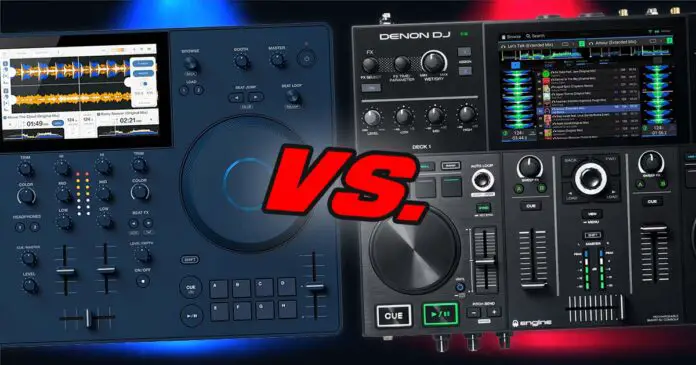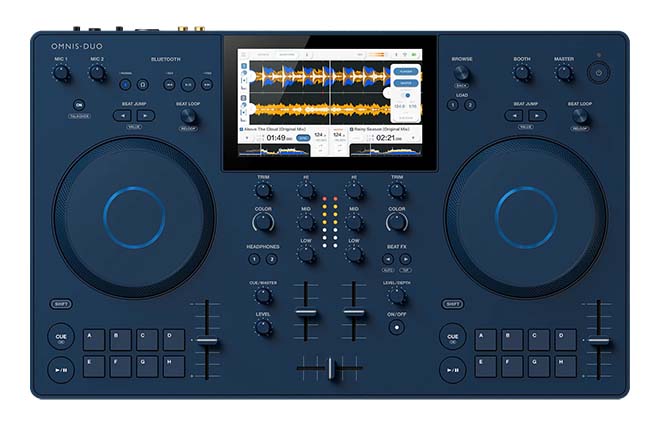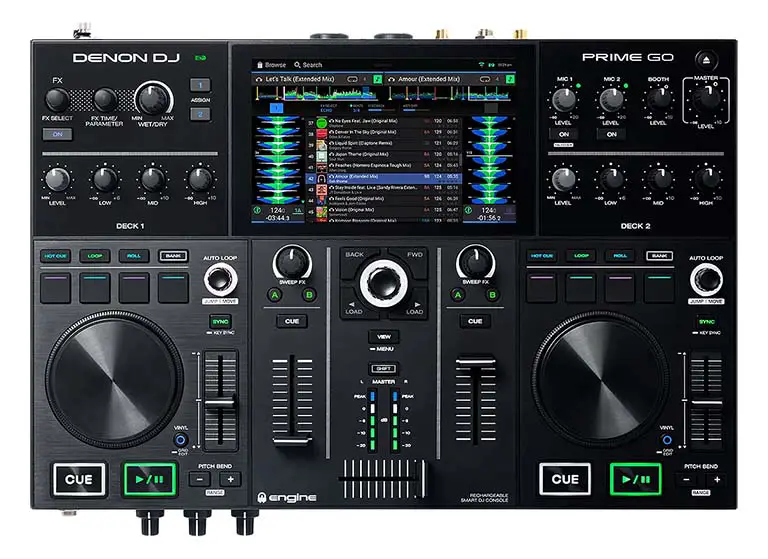I’m going to start by saying that I’m not here to shill the new device from AlphaTheta. Rather, I want to compare it point by point with the Denon DJ Prime GO to see which one of these devices is objectively a better pick if you want a small form factor standalone DJ controller. Think you know the answer already? Well, read on to see my take on that!
Check out my full review of the AlphaTheta OMNIS-DUO here – AlphaTheta OMNIS-DUO – My Final Review (No Sugarcoating)
This web portal is reader-supported, and is a part of the Amazon Services LLC Associates Program and the eBay Partner Network. When you buy using links on our site, we may earn an affiliate commission!
Quick Unit Comparison
- Supports both Rekordbox & Serato DJ Pro.
- Has neat half-size jog wheels.
- Has on-screen microphone EQ controls.
- 8 performance pads.
- Can use any compatible USB-C power supply.
- The price is rather steep.
- A rather minimalistic button layout.
- Many features can be controlled oly via on-screen controls.
- Smaller than the OMNIS-DUO.
- Much more affordable.
- 3rd party streaming services integration.
- Very well thought out button layout.
- Works well with Virtual DJ when in wired mode.
- Doesn’t support neither Rekordbox, nor Serato.
- Small jog wheels mostly unfit for scratching.
- Must be used with its own power brick.
First of all, if it wasn’t clear already, these two controllers, alongside with the slightly less powerful Numark Mixstream Pro GO, fill the niche of portable standalone all-in-one DJ controllers that can be used on the go without having to plug them into a laptop to mix music live.
Just because of the fact that these devices are so similar when it comes to their feature sets, but still somewhat apart in price, I thought that this comparison would be helpful to some of you out there. Especially if you’re confused about the rather steep price of the newly released AlphaTheta OMNIS-DUO (as I was, and still am, quite honestly).
Here is everything you should know before deciding to get yourself one of these professional DJ controllers, and there are some important things to cover!
The Main Differences
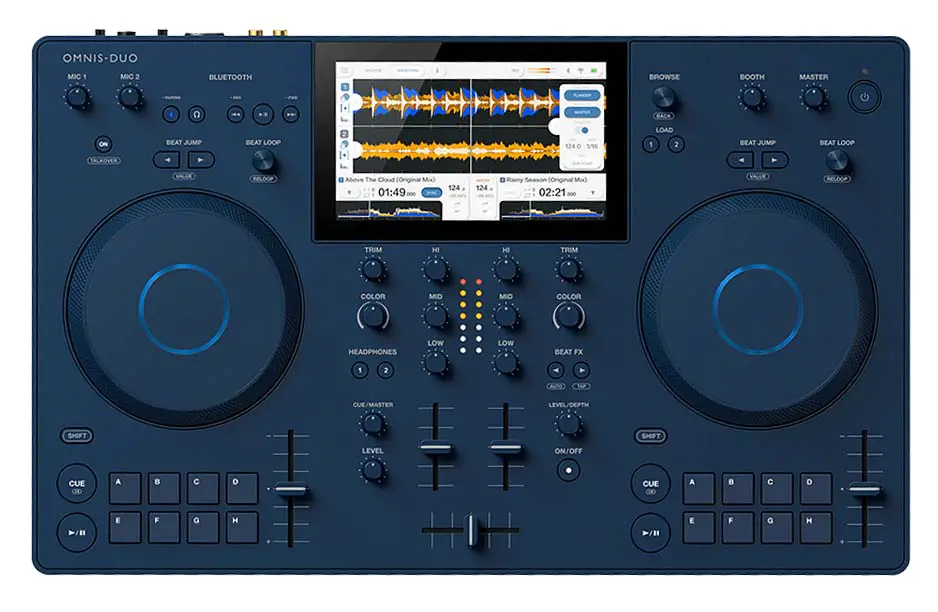
OMNIS-DUO is a DJ controller from AlphaTheta (formerly Pioneer DJ), which is meant to be a fully standalone unit with the possibility of pairing it with near-zero latency WAVE-EIGHT SonicLink Bluetooth Speakers for the true wireless on-the-go mixing experience.
The Denon DJ Prime GO, on the other hand, is essentially a smaller, portable and somewhat cut-down version of the full-scale Denon DJ Prime controller series – the main line of the standalone DJ devices from Denon.
While in terms of the basic functionality that they provide, these units are pretty similar, there are some quite important differences between them you should be aware of if you’re considering getting yourself either of them. Let’s get to it.
You might also like: Denon DJ SC Live 4 vs. Prime 4 (Direct Comparison!)
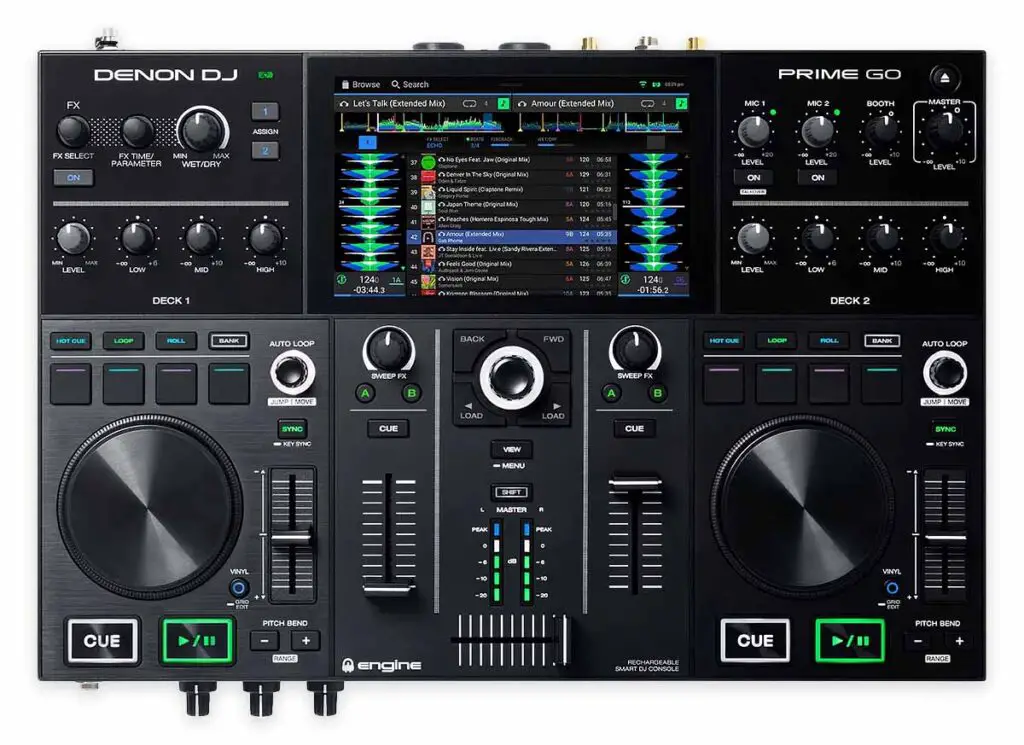
Aside from the obvious differences when it comes to the control layout, such as the Prime GO having its equalizer knobs on top of each deck instead of on the mixer section, and featuring only 4 performance pads per deck (with a doubling function, so you still have access to 8 hot-cues, loops, etc.), the functionality of the front panel controls doesn’t really differ much between the OMNIS-DUO and the Prime GO.
The casing of the Prime GO is also made out of metal, in comparison to the mostly plastic case of the OMNIS-DUO. This is the first thing that makes the Prime GO feel a little bit more professional and less like a toy, at least in my opinion, aside from its button layout design giving a less minimalistic feel.
The Denon controller is also notably smaller than the device from AlphaTheta, which does make it more portable.
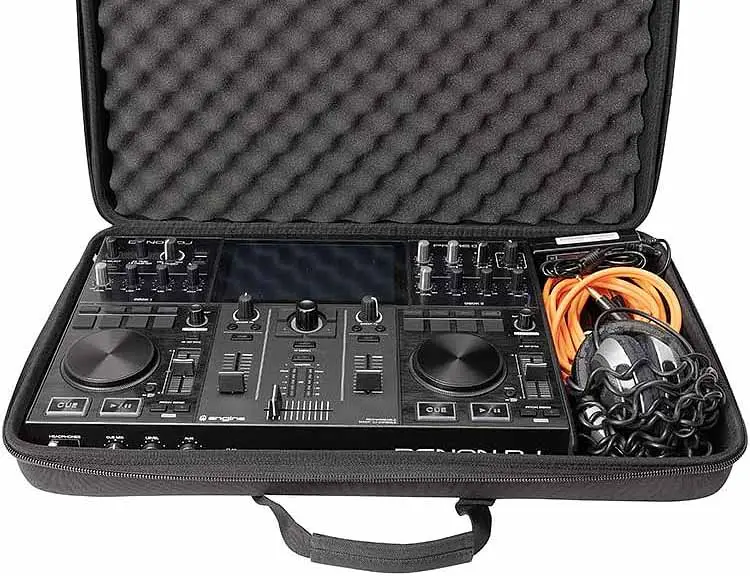
When it comes to the smaller jog wheels of the Prime GO, yes, these are not made for scratching in mind, and yes, they are not exactly a pleasure to use if you’re like me, used to at least the half-scale size standard of the DDJ-FLX4 / DDJ-400 jog wheels. But then again, the size of the controller does compensate for that in a way.
For now, there is no option to change the waveform view from horizontal to vertical on the OMNIS-DUO, while the Prime GO has this feature readily available. The only thing you can adjust about the audio visualization on the AlphaTheta device are the colors of the displayed waveforms. This option on the other hand, is not there on the Denon controller.
Another thing is that you have access to microphone EQ settings only on the OMNIS-DUO (through the use of on-screen controls). The Denon DJ Prime GO sadly does not offer you any kind of equalizer controls for its microphone input, which is honestly quite surprising. Just another thing to note.
The Performance Pads
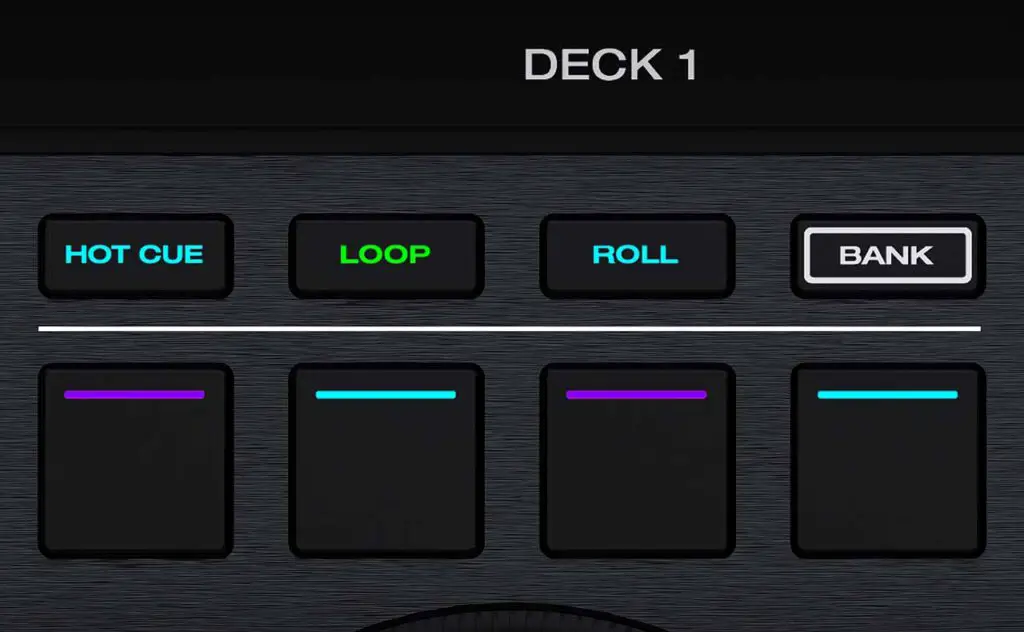
The Denon DJ Prime GO does have 4 distinct performance pad modes you probably already know from other DJ controllers, and that is the hot cue mode, loop presets, loop roll mode and sampler. The OMNIS-DUO quite curiously doesn’t give you access to anything other than simple hot-cue and loop controls using its 4 performance pads per deck.
While the Prime GO only features 4 performance pads on each deck, you can easily access the remaining 4 virtual pads by clicking your selected pad mode button again. This way you can access the standard amount of 8 performance pads per deck on this device.
Last things last, the AlphaTheta OMNIS-DUO does not have any kind of RGB lighting going on when it comes to its performance pads. The Prime GO has small RGB light strips on its pads, letting you color-code your loops, hot-cues and samples. Pretty neat.
Bluetooth Audio Output
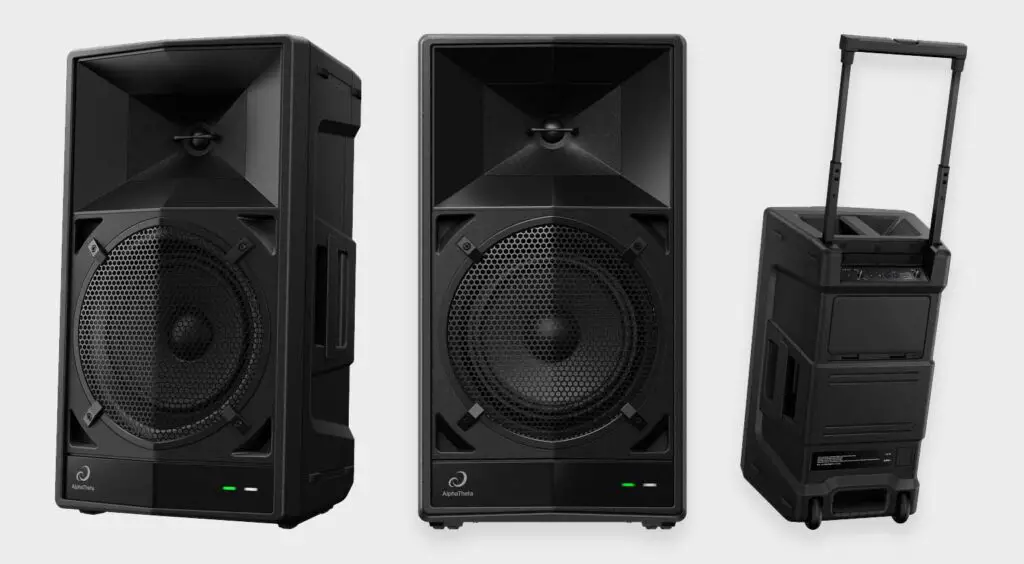
While you can easily use the OMNIS-DUO with any Bluetooth speaker as its output, the inherent latency involved in BT communication will most likely be too much to be able to comfortably mix music live. This is when the WAVE-EIGHT low-latency speaker recommended (and manufactured) by AlphaTheta comes in.
In short, this neat device offers you the ability to transfer audio from the controller to the speaker (or speakers) wirelessly via Bluetooth, but with the use of its special transmitter module, with near-zero audio transfer latency, allowing you to actually mix and beatmatch without any trouble. You can read more about this in my full review of the OMNIS-DUO here.
Denon Prime GO, does not offer Bluetooth audio output functionality at all, however of course you could also attempt to use it with the WAVE-EIGHT speaker transmitter.
DMX Lighting Controls
This, on the other hand, is a feature unique to the Prime GO taking into account only these two devices. There’s really nothing more to add here. If you make use of a DMX lighting setup and want to synchronize and control it straight from your DJ controller, you should go with the Prime GO.
Operating Systems & DJ Software
The OMNIS-DUO runs on the AlphaTheta OS, while the Denon DJ Prime GO utilizes the Engine OS. The differences between them are there mostly when it comes to their user interfaces, but in the end both of these pieces of software are responsive and have very similar set of basic features and settings that you can tweak to personalize your mixing experience.
Notable things here are the lack of microphone EQ controls on the Prime GO, and the lack of support for vertical waveform view on the OMNIS-DUO.
When it comes to the DJ software supported by these devices, the OMNIS-DUO supports both Rekordbox and Serato DJ Pro (from the next update), while the Denon DJ Prime GO has integration with Virtual DJ, and does not support neither Serato, nor Rekordbox. If you want a standalone Denon DJ controller which can be used with Serato, you might wanna take a look at the main Denon DJ Prime 4 series.
Streaming Services Support
On the Denon DJ Prime GO you can make use of Beatport, Beatsource LINK, SoundCloud GO+ and TIDAL for sourcing your music, provided you have appropriate subscriptions, plus you can easily stream your tracks from Dropbox.
The AlphaTheta OMNIS-DUO, at least for now, only has support for Rekordbox CloudDirectPlay, allowing you to stream your own music files from a Dropbox account. However, there are said to be plans for future third party streaming service support. We’ll see how that goes!
USB-C Power Supply?
The OMNIS-DUO has one huge advantage that the Prime GO does not have. It’s the fact that it can be powered by virtually any compatible universal USB-C charger, which is a big plus. You can even charge it using a 45W powerbank like this one!
With the Denon DJ Prime GO, you have to rely on the power brick it comes with, and you’re pretty much stuck with that. To use your Prime GO with an external powerbank, you’d have to utilize a separate, third party USB-C to Barrel Plug adapter, like the one mentioned in this Reddit thread.
What About The Numark Mixstream Pro GO?
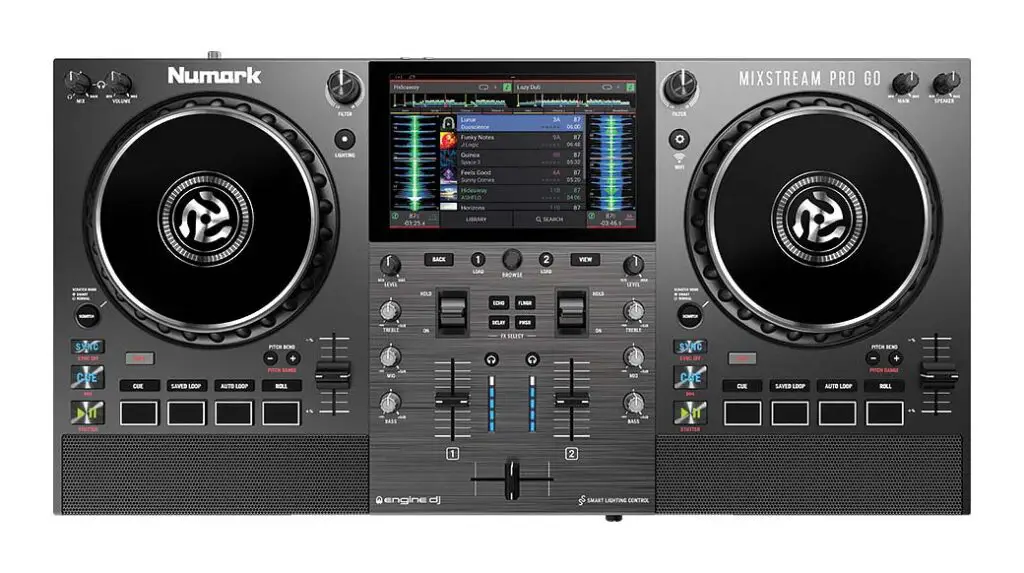
The Numark Mixstream Pro GO is a neat cheaper alternative to both the OMNIS-DUO and Prime GO, and it comes with two built-in stereo speakers. It’s also fully standalone, meaning that you don’t need to carry a laptop when you’re using it, and it also has a built-in battery, which the original Mixstream Pro didn’t have.
While it’s slightly less powerful CPU-wise, it’s not really a noticeable difference when you’re using it. With the two controllers compared in this article, the Mixstream Pro GO is among the 3 most popular portable standalone DJ systems to date!
So… I’ve Got My Winner
As you might have probably guessed, for me, the Denon DJ Prime GO is a clear winner when compared both to the AlphaTheta OMNIS-DUO, and the Numark Mixstream Pro GO. This has to do both with its smaller form factor, metal casing and immediate streaming services support, but also with the control layout that for me is much more desirable than the rather minimalistic approach to the physical controls on the OMNIS-DUO.
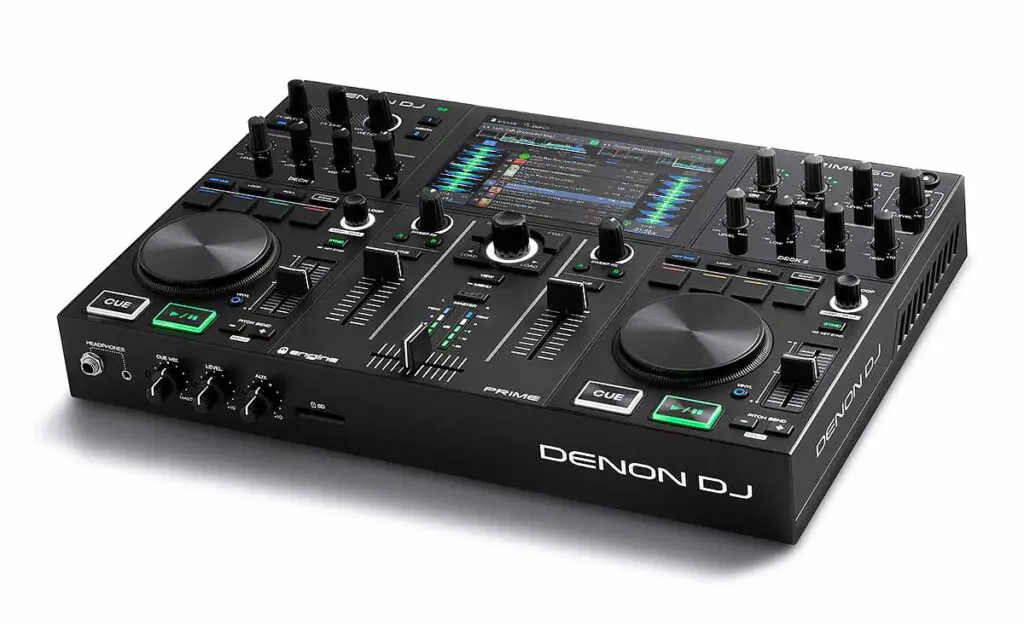
Not having larger jog wheels on board, a microphone equalizer, or built-in speakers isn’t really an issue for me, although of course it would be nice to see at least some of these things in the new iteration of the Prime GO series. Nevertheless, if you’re looking for a perfect portable DJ controller for mixing on-the-go, this is my personal recommendation for you!
You might also like: Is The Traktor Kontrol S4 Mk3 Still Worth It This Year? – Let’s See!

